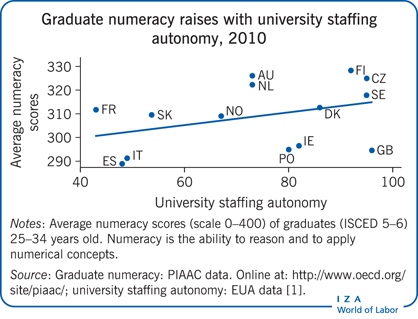Elevator pitch
University autonomy and funding is an important aspect in university-level education due to its impact on graduates’ competencies, and on the quality and quantity of research produced. Political factors influence the amount of autonomy allotted to public universities in specific countries. There is sufficient evidence to suggest that an increase in autonomy for universities would provide better educational outcomes and have a direct impact on labor market productivity. However, the debate on autonomy has been overshadowed by discussions on tuition fees and student aid in political circles.
Key findings
Pros
Increased university autonomy contributes to graduates’ competencies and university research output.
Funding and student aid have a significant impact on graduates’ competencies and university research output.
The competencies of graduates and university research output are closely and positively related to labor productivity.
Employer satisfaction with university graduates appears to be closely related to the quality of university research.
Cons
University autonomy is limited in many countries, primarily due to political opposition.
It is difficult to determine an accurate and agreeable measure of university autonomy.
Comparing the level of autonomy across different systems is difficult.
